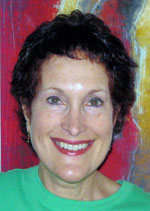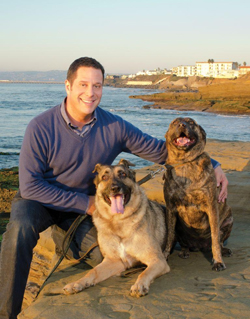By Mimi Pollack


SAN DIEGO — The Merriam-Webster dictionary defines Humane as “being marked by compassion, sympathy, or consideration for humans or animals.” This is a good description of Dr. Gary Weitzman, president and CEO of the San Diego Humane Society and co-host of Animal House on NPR. Giving back to society and helping animals in need has been Weitzman’s stated mission in life.
Weitzman came to the San Diego Humane Society in May 2012. Since then, he has brought his boundless energy and vision to the organization. He is spearheading what he calls “The Treatable Pet Initiative.” The goal is to save the life of every adoptable animal in San Diego Animal Welfare Coalition (SDAWC) shelters by targeting four key areas:
1] Spaying and neutering being offered to the community targeting those who otherwise might not be able to afford it.
2] Transporting animals from shelters that don’t have the space or resources to care for additional animals.
3] Increasing the number of incoming admissions and outgoing adoptions to impact more animals and help more people in the community.
4] Reaching more animals by pledging to do everything possible to keep animals in their homes by providing veterinary care, vaccination clinics, and needed pet supplies.
Weitzman hopes this will be a community initiative with collaboration and the support of donors. The final goal is “Getting to Zero” where no healthy animal is euthanized.
Weitzman, 54, grew up in Boston in an observant, conservative Jewish household. From the time he was a child, he knew he wanted to be a vet and assist others. His family attended a temple led by Rabbi Harold Kushner, author of When Bad Things Happen To Good People. Aaron Kushner, the son of Rabbi Kushner [was a friend growing up and it saddened Weitzman to see Aaron’s deterioration and eventual early death from Progeria.
Although he loved animals, Weitzman could not convince his parents to get a dog until he was 16, but he had many gerbils and hamsters as pets. Ironically, the dog, a chow mix, became his mother’s faithful companion.
Weitzman received a B.A. in Biology and English from Colby College, an M.A. in Public Health from Boston University’s School of Public Health, and completed his formal education with a Doctorate of Veterinary Medicine from Tufts University. While in Veterinary school, at age 25, he got his second pet dog, a greyhound. Not only did he love the breed, he also wanted to give back after having worked on 80 greyhound cadavers while in training.
He joined the Air Force in 1993 and put his Public Health degree working in food safety, workplace safety, and nuclear safety. He was stationed in both Texas and Washington, D.C. After being relocated to Wyoming for duty, he began to moonlight at an emergency vet clinic in Boulder, Colorado, to which he would drive on weekends. This allowed him to combine both of his passions. He then was “loaned” to the U.S. Army where he managed a breast cancer research program. He served actively for four years, and spent another five years in the Air Force Reserve.
In 1997, he moved to northern California taking over a practice of a companion animal hospital in Burlingame. He stayed there until 2003 when he was hired as the president and CEO of The Washington Animal Rescue League in Washington, DC.
After selling his practice and before moving to Washington, he briefly considered studying to become a rabbi. However, a discussion with the head of a rabbinical school convinced him that was not his next path in life. Today he views himself as a spiritual person with some ties into Judaism, but not so much to organized religion.
The next chapter in his life as president of the Washington Animal Rescue League was a successful one. During his tenure there, he guided the organization into becoming a national resource for disaster and puppy mill rescues as well as leading a large, urban, homeless animal rehabilitation and adoption center through a period of unprecedented growth. Weitzman stated that he felt satisfied with all that he accomplished during the years he spent there, but he had a longing to return to California. In May 2012, he accepted when the position at the San Diego Humane Society was offered to him. Since then, he has worked overseeing all four campuses.
Weitzman says he really enjoys his new life in San Diego. He feels that this is one of the best cities in terms of lifestyle. He lives here with his two beloved rescue dogs, Jake, a three-legged, very expressive German shepherd, and Betty, a calm and sweet pit bull mix. In that his organization is one of the largest shelters in the nation, he says it can be a role model for others and lead the way in making a difference. He confided that he had never seen a shelter of this caliber and size. There are over 300 employees. Most shelters have about 30.
Weitzman co-hosts Animal House on KPBS (89.5). He answers people who call in asking questions about their pets. The show airs locally on Saturday mornings at 5 a.m. and Sunday evenings at 7 p.m. In addition, he has a new book out called, How to Speak Dog that he co-authored with Aline Alexander Newman for National Geographic. Their next book, How to Speak Cat is coming out in September 2014. “I am never going to retire,” Weitzman declares. “I have too much to do and give back to the world.”
*
Pollack is a freelance writer who specializes in stories about animals. Based in La Mesa, California, she may be contacted at mimi.pollack@sdjewishworld.com
*
San Diego Jewish World seeks sponsorships to be placed, as this notice is, just below articles that appear on our site. This is an ideal opportunity for your corporate message or to personally remember a loved one’s contributions to our community. To inquire, call editor Donald H. Harrison at (619) 265-0808 or contact him via donald.harrison@sdjewishworld.com
Thank you, Charlotte. xo
Pingback: More to dog language than 'bow wow' - San Diego Jewish World
So proud of you, Gary!
This is a beautifully written article bout a truly dedicated and compassionate man with a clear vision.